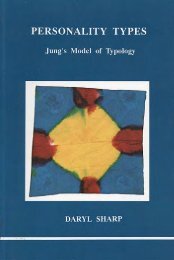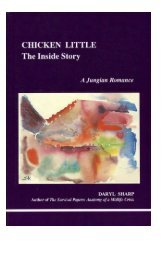Digesting Jung: Food for the Journey - Inner City Books
Digesting Jung: Food for the Journey - Inner City Books
Digesting Jung: Food for the Journey - Inner City Books
You also want an ePaper? Increase the reach of your titles
YUMPU automatically turns print PDFs into web optimized ePapers that Google loves.
On Becoming Conscious 87<br />
ess. Given decent mirroring in <strong>the</strong> early years, we stand a good<br />
chance of acquiring a healthy ego. But again, this is not <strong>the</strong> same<br />
thing as being conscious. There are lots of take-charge people with<br />
very healthy egos—captains of industry, politicians, artists, entrepreneurs<br />
and so on—who are quite unconscious. You can be a<br />
leader, run things like a clock and manage o<strong>the</strong>rs well. But if you<br />
don’t take <strong>the</strong> time to introspect, to question who you are without<br />
your external trappings, you can’t claim to be conscious.<br />
Mature consciousness, according to <strong>Jung</strong>, is dependent on a<br />
working relationship between a strong but flexible ego and <strong>the</strong> Self,<br />
regulating center of <strong>the</strong> psyche. For that to happen one has to acknowledge<br />
that <strong>the</strong> ego is not in charge. This is not a natural process;<br />
it is a major shift in perspective, like <strong>the</strong> difference between<br />
thinking <strong>the</strong> earth is <strong>the</strong> center of <strong>the</strong> solar system and <strong>the</strong>n learning<br />
that <strong>the</strong> sun is. This generally doesn’t happen until later in life,<br />
when you look back on your experience and realize <strong>the</strong>re was more<br />
going on than you knew. Ergo, something o<strong>the</strong>r than “you” was<br />
pulling <strong>the</strong> strings.<br />
Becoming conscious, <strong>the</strong>n, is above all not a one-time thing. It is<br />
a continuous process, by <strong>the</strong> ego, of assimilating what was previously<br />
unknown to <strong>the</strong> ego. It involves a progressive understanding<br />
of why we do what we do. And a major step is to become aware of<br />
<strong>the</strong> many ways we’re influenced by unconscious aspects of ourselves,<br />
which is to say, our complexes.<br />
<strong>Jung</strong> visualized <strong>the</strong> unconscious as an ocean, because both are inexhaustible.<br />
Freud saw <strong>the</strong> unconscious, or subconscious, as little<br />
more than a garbage can of fantasies and emotions that were active<br />
when we were children and <strong>the</strong>n were repressed or <strong>for</strong>gotten. <strong>Jung</strong><br />
accepted that <strong>for</strong> a while. He was an early champion of Freud’s<br />
dogma, but in <strong>the</strong> end it just didn’t accord with <strong>Jung</strong>’s own experience.<br />
<strong>Jung</strong> came to believe instead that <strong>the</strong> unconscious also includes<br />
contents we never knew were <strong>the</strong>re: things about ourselves<br />
in our personal unconscious, and <strong>the</strong>n, at a deeper level, <strong>the</strong> collective<br />
unconscious, all <strong>the</strong> varied experiences of <strong>the</strong> human race, <strong>the</strong>










